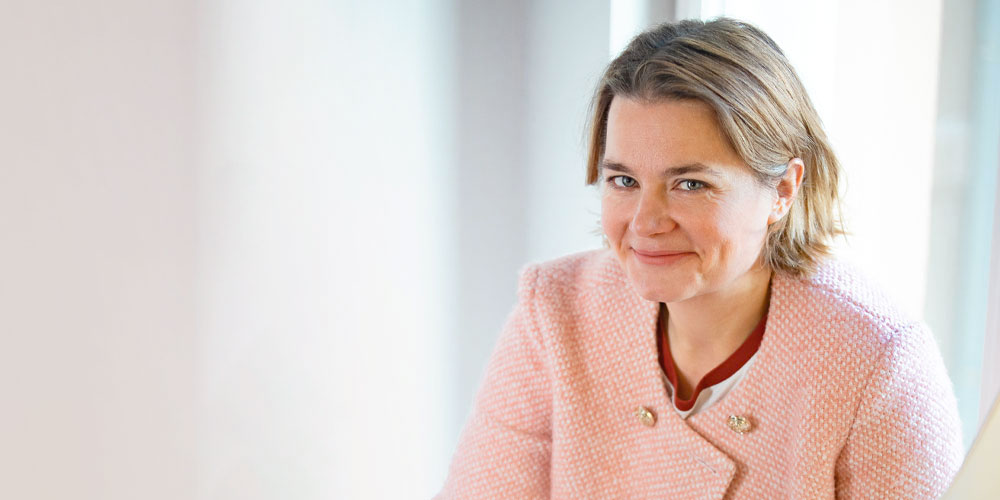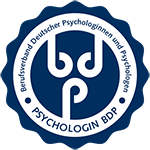Is a psychologist really the right person for me?
l know all too well why people are sceptical.
I often work with people who carry a lot of pressure in their lives, who have to make big decisions, and who appear quite strong on the outside. They don’t come to me because something is ‘not working.’ They come because they realise that something inside them isn’t quite right anymore.
My work isn’t about optimising, diagnosing, or finding quick fixes. It creates a space where clarity can be achieved – beyond roles, expectations, and self-image.
I work in a person-centred way, which means without stereotypes, without having the authority to interpret, without expecting you to change. I listen, ask questions and stay where things are still unclear.
This is not about becoming better. It’s about becoming more authentic.
From the outside, everything seems fine.
And yet there are those moments when something doesn’t really feel right.
Many people are working tirelessly on their own behaviour, resilience and performance. And in doing so, they miss the crucial question: is the life I am living truly right for me?
Such inner unease is not necessarily a deficit. Often, it is a signal that needs to be taken seriously. Not everything that hurts is pathological – and not everything that feels good will help us to move on.
I do not offer a path to self-optimisation. I offer a place for clarity. What comes of it is simple: some things change, some things stay the same, some things end.
Clarity comes first, then change. Anything else is mostly just action for the sake of action.
As a psychologist working with a person-centered approach, I differ from other methods (such as psychoanalysis or cognitive behavioral therapy) in the following ways:
We see all of the person.
As a result, our goal is not to solve a specific problem in a stand-alone approach. Instead, the focus is on your overall mental fitness. Helping you cope with both the current problem and later difficulties in a better way: becoming more independent, more responsible, less confused, better organised.
Our focus is the here and now.
For us, there is rarely a need to ask “why” or to do a comprehensive analysis of childhood. This is because the significant patterns always show up today as well.
We focus on your strengths.
It is about you and what you can do – not about your psychological state. We see you as the expert in your life, which you are.
We emphasise your individual freedom.
In person-centred counselling, we see the potential which is inherent in individual freedom – both large and small. Specifically, one way in which this is manifested is that the client brings his or her own problems into the session and effectively “leads” the entire session (not the therapist). As such, the approach is ideal for people who are motivated by self-knowledge and are willing to work towards the solution of their problems.
The therapeutic relationship itself is an important part of therapy.
What is known as the therapeutic relationship provides a positive experience and is the key element of therapy in our work. In a climate of conversation that is non-judgmental, respectful and empathetic, people succeed in understanding themselves, making important decisions on their own and building good relationships with other people. Just as we have been mentally damaged by dysfunctional relationships, we can be healed by good relationships.
Frequently Asked Questions
Does the public health insurance in Germany cover your counselling?
This counselling is a strictly private service and unfortunately not covered by the public health insurance. With private health insurance, there is sometimes the option of having the costs covered. However, this is rather the exception, as I do not charge according to the scale of fees for psychotherapists (GOP), which is often a prerequisite for private health insurance. It is recommended that you check the insurance plan you have signed up for.
Can I come to you as a health insurance patient via the cost reimbursement procedure?
I’m afraid not. I can actually only work with patients who pay for themselves.
What qualifications do you have?
I am a qualified psychologist (TU Berlin 2004), a state-licensed alternative practitioner for psychotherapy, a person-centred counsellor certified by the GwG (Gesellschaft für Personzentrierte Psychotherapie und Beratung e.V.) and am currently training in person-centred psychotherapy (also by the GwG). At the DFI (German Focusing Institute) I was trained in Focusing, another humanistic form of therapy with a stronger emphasis on the body. Through regular supervision and training therapy with a person-centred colleague, I take deliberate care of my own personal development and ensure that I consistently provide my clients with the best support.
Do you also work with children and young people?
I work with both adults and young people.
However, I’m afraid I’m neither trained nor equipped to work with children.
Which psychological approach do you apply?
My foundation is the person-centred approach to counselling and psychotherapy – also known as talking therapy. It was founded by the American psychologist Carl Rogers and focuses on the therapist’s empathic and authentic attitude and on the respect he or she shows to the client. For us, this means meeting the client in an non-judgmental and open-minded way. Person-centred counselling and therapy belongs to the group of humanistic therapies.
Besides humanistic psychotherapy as a major “line”, there are also psychodynamic and behavioural therapies. Among all three, various specific therapeutic approaches have become established, as its original ideas continue to be developed.
- Basically, however, psychodynamic approaches are about the unconscious and childhood (because the origin was good old Sigmund Freud). The therapist adopts the role of the expert here.
- In behavioural therapy approaches, the guiding idea is that any beneficial or harmful behaviour can be learned and therefore unlearned. In other words, here the therapist works primarily with beneficial and non-beneficial thoughts (or cognitions). Again, the therapist is more in the role of expert or teacher.
- In humanistic approaches, including person-centred therapy, the therapist works explicitly on an equal footing with the client. The focus is placed on the client and not on the problem. The aim is that the client, with the help of the therapist, explores their behaviour and finds the capacity for self-fulfilment that is inherent in them so that they can solve their problems on their own.
How often do we need to meet?
Empirical evidence and research shows that for many clients a fairly small number of sessions is enough to deal with an acute problem: on average 6 to 8. Of course, this can be varied upwards or downwards from person to person.
More difficult issues (such as depression), obviously, take longer – here it may take 20, 30 or more appointments before a client feels stable again.
Another example where it usually takes a little longer: Recent research has shown that clients with suicidal ideations tend to need an average of 15 sessions before they could experience a significant improvement in their well-being.
Is your online counselling 100% secure in terms of data protection?
It is. I use the commercial version of Zoom for online calls. Here I have both specified the location of the server (EU) and set up strict end-to-end encryption of the calls. According to current standards, this meets the EU’s strict data protection guidelines. However, I always keep my eyes open and always adapt when data protection changes – or Zoom.
Do I need to prepare for the counselling sessions?
Research shows that the absolutely most important parameter for the success of counselling or therapy is the client’s participation. You might also say: It is you, not me, who makes our work successful.
In general, the client grows most in the counselling process when they have a positive but realistic attitude towards the counselling. Or to be even more precise:
- when they expect the counselling to be helpful
- when they are aware that counselling can sometimes be challenging and difficult
- if they are clear about what counselling actually is and why they are doing it.
That is all you need to prepare.
What does "counselling" mean?
Counselling is a term that has become strongly established in the US and UK. (In Germany it is often translated as “therapeutic consultation” or “psychological consultation”).
It is the type of treatment that deals with “milder” mental health problems: anxiety, depression, loneliness, to name but a few. This differs from clinical psychotherapy, which, often in clinics, treats “more severe” cases, e.g. schizophrenic patients.
In Anglo-Saxon countries, however, many people argue that there is actually no fundamental difference between counselling and psychotherapy. The only difference is the setting: counselling is provided in a private practice, while psychotherapy takes place in a clinic.
You can contact me here.
You can meet me in person at my private practice on Kurfürstendamm in Berlin or online, no matter where you are.
You have three discreet ways to get in touch:
- Book your appointment directly in my calendar.
- Write to me at office@brittabettendorf.com
- Or call me: 030-220131181.
I look forward to talking to you.









 Member of Gesellschaft für Personzentrierte Psychotherapie und Beratung e.V.
Member of Gesellschaft für Personzentrierte Psychotherapie und Beratung e.V.